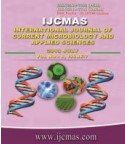


 National Academy of Agricultural Sciences (NAAS)
National Academy of Agricultural Sciences (NAAS)

|
PRINT ISSN : 2319-7692
Online ISSN : 2319-7706 Issues : 12 per year Publisher : Excellent Publishers Email : editorijcmas@gmail.com / submit@ijcmas.com Editor-in-chief: Dr.M.Prakash Index Copernicus ICV 2018: 95.39 NAAS RATING 2020: 5.38 |
This study was undertaken to document the gendered access to assets, to assess and improve the nutritional status of tribal women and children, to facilitate capacity building and skill upgradation through need based and sustainable interventions for improving livelihood and to document the impact. The sample of the study include 160 tribal families from two clusters of tribal villages in Shamakhunta block in Mayurbhanj district and R. Udayagiri block of Gajapati district in Odisha. The analysis of gendered access to assets revealed that 94% of the assets were with male; and almost 60% of the activities in crop production and 85% of activities in livestock management were performed by women. The project built the capacity of tribal families and grassroots institutions, enhance the access of poor tribal people to knowledge and innovations to increase the productivity of the resources in environmentally sustainable and socially equitable ways. Women from tribal communities were empowered with requisite knowledge and skills and trained in leadership. It was ensured that they are engaged in viable income generating activities through improved skills and livelihood support, and increased knowledge on household food and nutritional security. Outcome of this study would help in formulating gender based policy and services, enhancement of farm production for greater nutritional security of farm families, income and employment generation, drudgery reduction, improved health and nutritional status of women and children, empowerment of the tribal women, improvement in living standards, integrated development of the tribal families, and database having high practical utility for understanding the performance of gender based technological and social interventions in tribal ecosystem.
 |
 |
 |
 |
 |